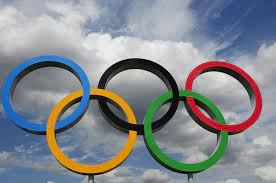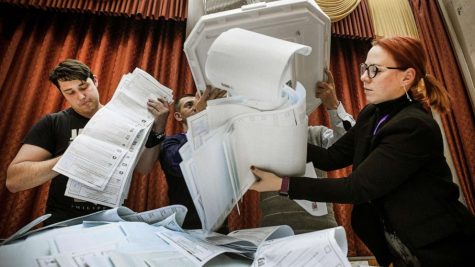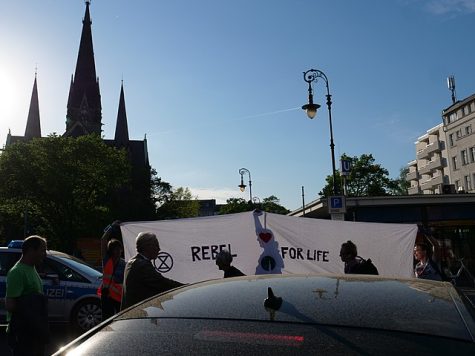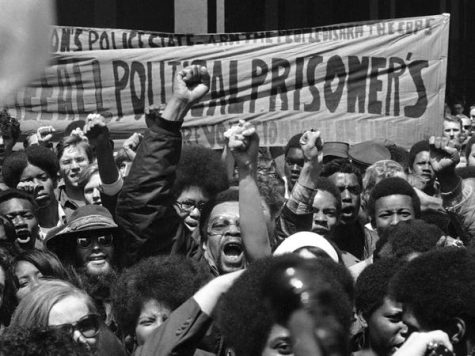Is Blood Thicker Than Water?
Reactions to the Meghan Markel and Prince Harry interview with Oprah.
March 11, 2021
Over the duration of the past week, the Royal Family’s reputation has been the main topic of discussion. Ever since Meghan Markel and Prince William’s transparent interview with Oprah was released people everywhere have been talking about it. The interview was the second most-watched, non-sport-related event worldwide. In the United Kingdom, an average of 11.1 million people watched the interview on the night of its premiere (BBC). While things brought forth in the interview have been discussed worldwide, obviously the most vocal country has obviously been, the United Kingdom
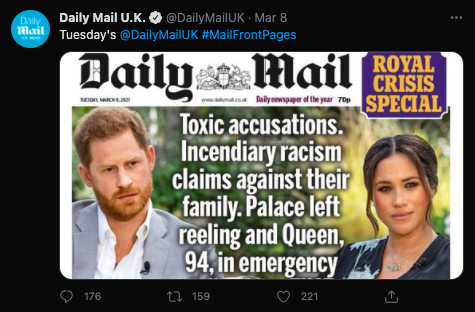
The day after the interview was released headlines of the Daily Mail read out “WHAT HAVE THEY DONE?”; whilst the front page of The Guardian read, “Palace in crisis.” Articles, upon articles, called out how Megan and Harry’s claims were “devastating” and an “insult to the Queen” (Washington Post ). Sources like The Metro deemed this new chapter of history “The war of the Windors,” in an address to allegations tarnishing the royal family (Washington Post ). The Sun Newspaper even wrote that “Meghan Markle may
never return to Britain after angering Royal Family with bombshell Oprah interview,” and coined the term “Mexile ” to mark the event (CNN). It is clearly safe to say that the British press monopolized from this event. However, the citizens themselves seem to be much more indifferent to the whole debacle.
In contrast to the headline reading, “Back to basics at their $14.5 million mansion” (CNN), the public’s perception appeared much less rash. In a YouGov opinion poll, nearly five thousand people were questioned about whether or not they deemed Harry and Meghan’s treatment to be fair or not. In the survey, 32% of people believed that they were treated with the utmost
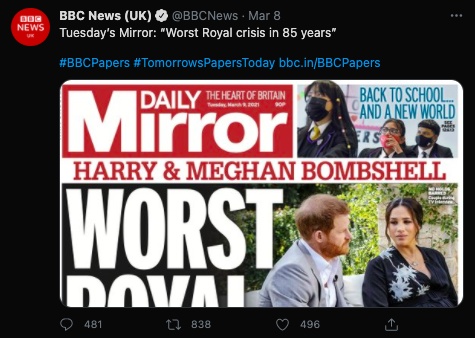
respect, while another 32% of people deemed their treatment unjust. Contrary, the most startling fact is that 36% have yet to choose a side, leaving their answer open-ended (BBC). Unlike the press, the people of the United Kingdom seem much more hesitant over who to side with, and understandably so. With still many unknown facts and the difficulty of deeming reliability, it is close to impossible to know who to believe and who not to. There does, however, seem to be a differentiation in opinion based on age. In the 65 and above quartile, 50% of people believed the treatment of Harry and Meghan to be fair, compared with only 13% of 18 to 24-year-olds agreeing (BBC). It has not been reported whether the remaining percentile in the receptive age groups was on the side of the opposition, or undecided. But it does make sense that the older generation would lean more towards the side that supports people they are more familiar with and have had more time to grow fond of than the younger generations. Curious to see if people had come to pick a side in this debate, YouGov conducted the same questionnaire a week later only to find that the numbers remained nearly the same.
Now, this trend does not apply to the entire population of the United Kingdom. There are always, of course, going to be radical believers on both sides, regardless of the topics of indecision. One keen example of this would be the infamous reaction former television host Piers Morgan had to the interview. Throughout his career, Morgan has always been a subject of controversy,
On Monday, I said I didn’t believe Meghan Markle in her Oprah interview. I’ve had time to reflect on this opinion, and I still don’t. If you did, OK. Freedom of speech is a hill I’m happy to die on. Thanks for all the love, and hate. I’m off to spend more time with my opinions. pic.twitter.com/bv6zpz4Roe
— Piers Morgan (@piersmorgan) March 10, 2021
frequently voicing opinions, and sticking to them. And after six years of this, he abruptly left mid-show when Markel was brought up. Morgan said he “didn’t believe a word” Megham had told Winfrey about her mental health in an interview. He referred to the duchess as the “Pinocchio Princess” in a tweet later that morning. In the same slough of tweets, Morgan explained how his “real concern was a disbelief frankly… that [Markel] went to a senior member of the Royal household and told them she was suicidal and was told she could not have any help because it would be a bad look for the family.” Shortly after this, Morgan announced his recognition from television, sending his farewells in a tweet: “Thanks for all the love, and hate. I’m off to spend more time with my opinions.” Morgan has always divided opinions, but an ITV spokesperson said: “Following discussions with ITV, Piers Morgan has decided now is the time to leave Good Morning Britain. ITV has accepted this decision and has nothing further to add,” making it seems clear that the network was content to see him go. After his Twitter escapades, a total of 41,015 complaints were made to Media Watchdog Ofcom, a mere few hours after (BBC). Like always, Morgan’s reactions have caused a great divide in opinions, people tending to take a stand to support or oppose.
Up until recently, representatives of the royal family have been quiet. However, the Queen recently released a statement saying: “The whole family is saddened to learn the full extent of how challenging the last few years have been for Harry and Meghan. The issues raised, particularly that of race, are concerning. While some recollections may vary, they are taken very seriously and will be addressed by the family privately. Harry, Meghan, and Archie will always be much-loved family members,” (USA Today). It seems that not only has the interview sparked conversation to the world, but also to the family itself. There is no telling where the allegations made in the interview are going to go in the future if they progress anywhere. Maybe evidence will come out leading the United Kingdom’s population to pick aside. Really, there is no clear-cut image for the effects that this one, two-hour interview can have on the legacy of an entire bloodline.



